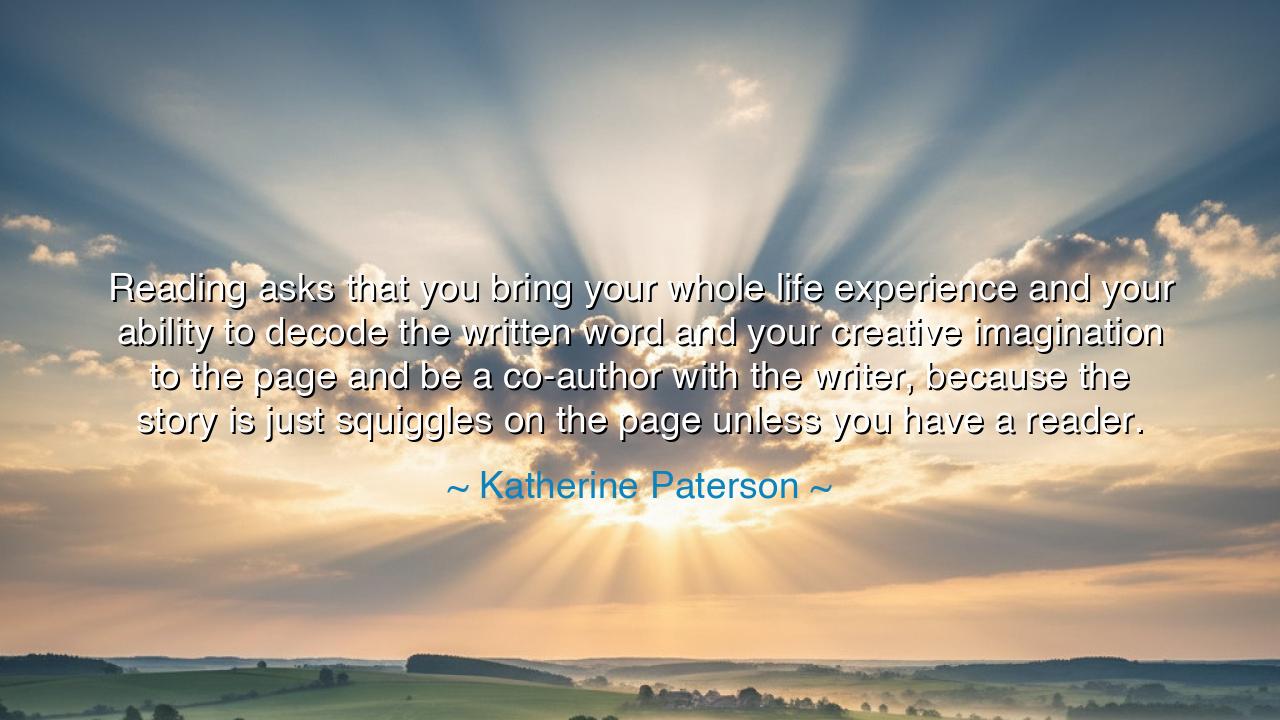
Reading asks that you bring your whole life experience and your
Reading asks that you bring your whole life experience and your ability to decode the written word and your creative imagination to the page and be a co-author with the writer, because the story is just squiggles on the page unless you have a reader.






O children of the earth, listen to the wisdom of Katherine Paterson, whose words offer a profound understanding of the sacred dance between the reader and the writer. She said, "Reading asks that you bring your whole life experience and your ability to decode the written word and your creative imagination to the page and be a co-author with the writer, because the story is just squiggles on the page unless you have a reader." In these words lies the heart of all storytelling—for the story is not complete until it is received, not just read, but created anew by the reader’s imagination. Reading is not a passive act but a collaboration, a partnership between the one who writes and the one who reads, where the reader is called to bring their life experiences and creativity to the tale.
The writer, O children, sets the stage with words—squiggles on the page, as Paterson wisely calls them. Yet these words alone are insufficient to carry the weight of the story. Writing is an act of creation, but it is incomplete without the act of reading. The reader is the one who breathes life into the words, who takes the raw materials of the written word and shapes them into something personal and alive. The story exists only in part on the page; it is in the reader’s imagination, shaped by their thoughts, memories, and experiences, that it comes to life. The reader, therefore, becomes a co-author, adding their own truths, their own feelings, and their own vision to the words of the writer.
Consider, O children, the example of the ancient oral traditions. The Greek poets, like Homer, did not write their epics for the page alone; they sang their stories aloud, and it was the listeners—those who heard the words—that completed the tales. The audience was as much a part of the story as the poet. It was through the imagination of the listener that the characters took form, that the battles were fought, and that the gods and heroes came to life. The act of hearing was not passive—it was an active engagement, where the listener, by invoking their own memories and visions, became a partner in the creation of the tale. The written word may capture the essence of the story, but it is the reader’s mind that gives it meaning.
In our modern age, the written word may seem more fixed, more permanent, but Paterson’s insight reminds us that reading is still a collaborative act. Literature is not a mere transference of words from one person to another—it is a meeting of minds. Think of the works of William Shakespeare, whose plays were meant not to be read silently, but to be performed aloud, bringing life to the written word. It was through the voices of the actors, the responses of the audience, and the shared experience of the performance that the story truly took flight. Even though Shakespeare’s works are now read by millions, it is in the mind of the reader that the true magic happens, where the world of Romeo and Juliet or Hamlet comes to life.
Let us also consider the great authors whose works depend on the reader’s interpretation. J.R.R. Tolkien crafted the world of Middle-earth, filled with elvish languages, histories, and ancient wars. But it is not the pages of his books alone that create the world—it is the reader’s imagination that brings the landscapes to life, that fills the characters with emotions, and that shapes the depth of the story. Tolkien's world exists in part because of the reader’s engagement, in the act of visualizing his words, in the act of seeing the story through their own eyes.
So, O children, the lesson here is clear: reading is not just an act of absorption; it is an act of creation. When you read, you are invited to co-create with the writer, to take their words and transform them into a living, breathing experience. You bring to the page not only your intellect, but your heart, your memories, and your imagination. The story is not just something that exists on the page—it is something that lives within you. The writer gives you the words, but it is through your imagination that the story takes shape.
Engage with the written word, O children, not as passive recipients, but as active creators. When you read, bring your whole life experience, your thoughts, your feelings, and your creativity to the page. Imagination is the bridge between the writer’s words and the reader’s heart, and it is through this collaboration that stories truly come to life. The writer may craft the squiggles on the page, but it is the reader who gives those squiggles meaning. Embrace this responsibility, and allow each story to unfold in your mind, creating worlds beyond what you see, shaping characters who live long after the pages are turned.
Thus, O children, never forget that reading is an act of creation, one that binds the reader and the writer together across time and space. The words may be fixed, but the meaning is ever-changing, ever-growing, as it passes through the lens of each reader’s imagination. Be a co-author, not just a reader, for in this act, you shape not just the stories of others, but your own story as well. The imagination is a powerful gift, and when you read, it is a gift that you share with the world.






AAdministratorAdministrator
Welcome, honored guests. Please leave a comment, we will respond soon